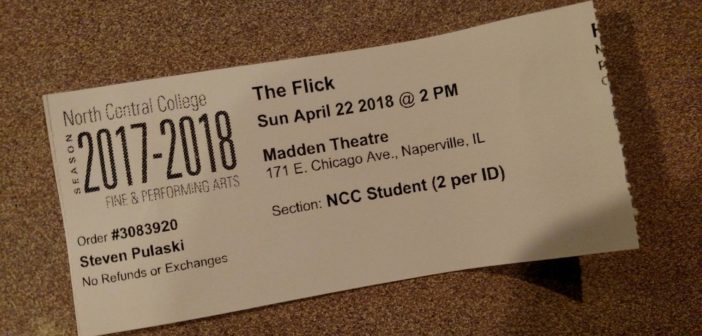Since it began its successful off-Broadway run in 2013 and subsequently went on to win a Pulitzer Prize the following year, Annie Baker’s play, “The Flick,” has earned divisive reactions from many different audiences.
At an uncommonly lengthy three hours, with interwoven racial and sexual tensions throughout, the play could adequately be described as “anti-theater.” Directed by North Central’s Carin Silkaitis, alongside assistant director Reagan Quynn, the play follows the unremarkable day-to-day tasks of Sam, played by Danny Ackman, ’21, and Avery, played by Tommie Hope, ’21. They are two employees at The Flick, a rundown movie theater in Boston.
Sam and Avery sweep popcorn and mop the sticky floors of the theater’s single auditorium after every show. If not awkwardly exchanging dialog while performing these banal tasks, they occasionally converse with the in-house projectionist, Rose, played by Jordan DePhillips, ’18. Rose serves as an all-seeing eye of sorts in her booth above the seats.
“The Flick” is very much postmodern. In several scenes, Sam and Avery speak in a series of movie references, playing a variation on the popular “Six Degrees” game where they try to link incompatible actors to one another through the films they’ve done.
At one point, Sam cannot believe Avery doesn’t believe there has been a single great American film made in the last 10 years. Avery is disgusted by Sam’s proclamation that “Avatar” is an excellent motion picture. Rose even takes a few paragraphs out of a book on astrological signs to try and define the relationships between the three individuals. It’s all unremarkable — it’s all real.
The play’s style is one both Silkaitis and Quynn bill as “micro-naturalist.” “It addresses societal issues that I think are very prevalent today and really not brought up or talked about,” Quynn said, referencing aforementioned undertones in the play that could absolutely fuel thoughtful discourse. “There’s a lot of stuff (in the play) that I feel like people today struggle with, and (the play) does a very good job at addressing that and calling people out on it.”
Quynn also notes the play’s frequent bouts of silences, which can sometimes extend past a minute, where actions define the stage business. This elevates the “micro-naturalist” style of Baker’s play, which makes conversations airy and banter that’s keenly observant of human interaction.
The body language of the characters is also significant throughout the play. Ackman wonderfully assumes the often slouchy, disgruntled demeanor of Sam, who has been stuck in this low-paying job well into his thirties. His opposite, Hope, finely tunes a performance that looks as if his Avery is always walking on eggshells, remaining in an ongoing shifty state when placed in a social situation. DePhillips is exuberant but down-to-earth in her portrayal of Rose. She’s charismatic in capturing passing flirtations, while at other times brutally honest when the moment calls for nothing less than the truth.
I was particularly moved by an instance involving Sam showing Avery something funny on his smartphone. “It’s about 15 seconds till the funny party,” Sam unnecessarily informs Avery, as the two smile while aimlessly watching the video. Up above, in the soundproof projection booth, Rose looks on, softly smiling and giggling to herself.
It’s these moments of bonding that make “The Flick” effective, but it’s the ever-present realism over the course of three vital hours that give you the impression you’ve just spent a part of your life working at this rundown theater, learning more about life than you might have ever cared to learn.

